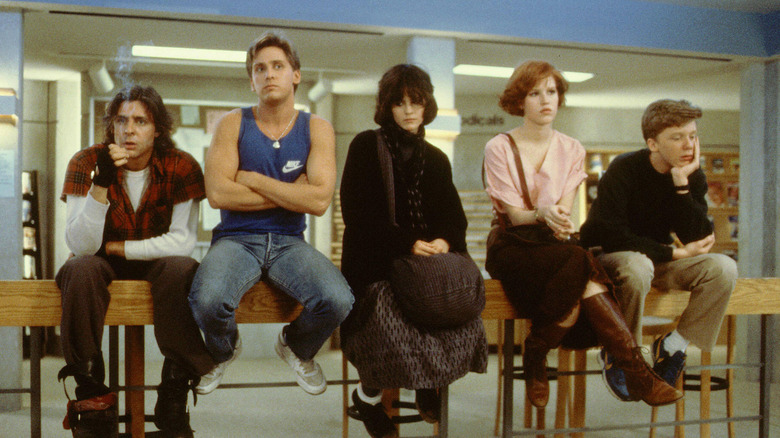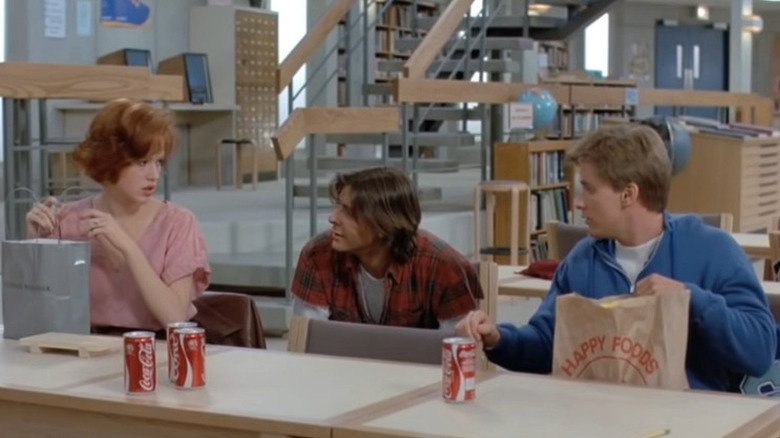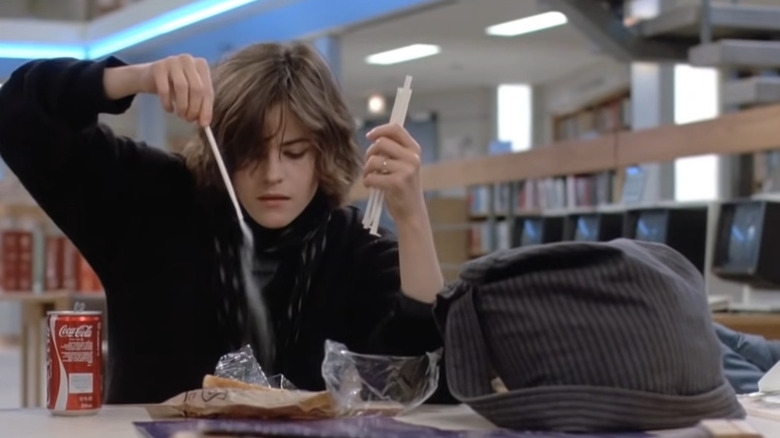The Daily Stream: The Breakfast Club Is A Problematic, Yet Quintessential 1980s High School Story
(Welcome to The Daily Stream, an ongoing series in which the /Film team shares what they've been watching, why it's worth checking out, and where you can stream it.)
The Movie: "The Breakfast Club"
Where You Can Stream It: Hulu with Starz add-on/Peacock with Premium
The Pitch: "The Breakfast Club" is a problematic film viewed through a modern lens. I'm going to get that out of the way at the top. Star Molly Ringwald wrote a beautiful piece for The New Yorker about revisiting the film in the wake of the #MeToo movement. It gives a new context to some of the things those of us who have loved the movie for years may not have thought of. Watching it nowadays for the first time is bound to make viewers question things. It's very white. It's very straight. There are jokes that would never be used these days, just as there are in many John Hughes films.
With that said — and it's essential to keep it all in mind — for kids at the time of the release of "The Breakfast Club," John Hughes spoke to them directly. You didn't see films that tried to get into the heads of teenagers before him outside of "Fast Times at Ridgemont High" (as Ringwald points out in her article). The kids in the films spoke the same way real kids did back then. They were dealing with the same issues. They fell for the same things. It's a time capsule for a decade when things were changing for teens, who were finally being marketed to and gaining a voice.
It's the story of five very different people stuck in weekend detention for various infractions who find out they're not as different as they thought they were.
Why it's essential viewing
When the film begins, five kids are sitting in weekend detention. Vice Principal Vernon (Paul Gleason) makes them write an essay about who they think they are. Aside from the fact that any kid is going to have a field day with that sort of topic, they're left alone for most of the day.
Brian (Anthony Michael Hall) is a "nerd," which at the time wasn't a cool thing to be. Remember, this was long before the days of Marvel. Andrew (Emilio Estevez) is a star wrestler and one of the "jocks." Folks, the '80s was full of labels. Allison (Ally Sheedy) is the "weird" kid who wears baggy clothes and dumps Pixy sticks on her sandwiches. Yeah, that was weird back then, I guess. Claire (Molly Ringwald) is the popular rich girl who cuts class to go shopping. Bender (Judd Nelson) is the "delinquent" whose crimes seem mild. Friends, he pulled a fire alarm and smokes. The horror!
At first, these kids are very much stuck in their usual tracks. Claire rolls her eyes at everyone and eats sushi for lunch (a fancy-pants meal in the '80s). Andrew talks only to her because of her popularity. Brian tries and fails to sound cool. Allison makes weird noises in the corner. Bender growls and insults everyone.
Of course, being isolated in detention gets them talking, and after a while, they reveal why they're really there. Things come out: suicidal thoughts after bullying, parental neglect, abuse, and drifting off into a solitary existence because no one understands your quirks.
We are not alone
There are sexist jokes. There is harassment. There is bullying. There is teasing. A lot of it is stuff that wouldn't (and shouldn't) fly now. It did back then. I know because though I'm younger than these kids (and the actors), I was in school not so long after that. It was really how people talked, and I attended a high school that was largely full of nice people. The harassment was considered normal, even though it was awful. (I am very, very glad that it's not anymore, though, of course, it still happens.) As Ringwald said in her piece, what we'd seen of teens before was all moralizing horror films where non-virgins are the first to die or after-school specials written by adults who had no idea what it was like to be a teenager in the 1980s.
Hughes spoke the language of teens to teens, which we hadn't seen before. It does not excuse the behavior, but it does at least explain why it was there. It still makes me laugh that the big controversy about the film (and the thing that was cut out of airline and basic cable versions) is the scene where they all smoke pot. The harassment was okay, but oh no, we mustn't let the children know about the *whispers* marijuana.
I guess what makes me watch this whenever I can is how a group of kids who would never speak to each other find common ground. Will they continue to be friendly after, despite the peer pressure? Maybe not, but for that one moment, they understood what it was like to walk in someone else's shoes; " ... a brain, an athlete, a basket case, a princess, and a criminal."


